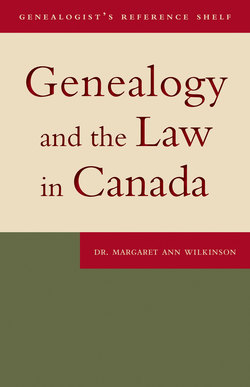Читать книгу Genealogy and the Law in Canada - Margaret Ann Wilkinson - Страница 7
На сайте Литреса книга снята с продажи.
ОглавлениеINTRODUCTION
As you know, genealogy is a fascinating study. Doing genealogical research is essentially an exercise in information-gathering. This may explain why genealogists are one of the most important (if not the most important) users of the services and resources of public libraries in Canada today. Increasingly, however, we are told that we are in the “information age” — and one result of this new state of affairs is that information is becoming an engine of our economy. As such, information is more and more viewed from the perspective of its commercial value.
On the other hand, democracies traditionally view access to information as a cornerstone, enabling societies to remain free and democratic. The organs of the law (legislatures and the judiciary) are becoming involved in striking a balance between these two impulses. Because genealogists are intimately involved with information, a number of these changes in the legal environment have a direct impact on your work.
Since most of the population of North America reflects the immigrant experience, either in this or previous centuries, doing genealogical research, for most people, is a fascinating exercise in local, regional, national, and international information-gathering. The development of digital records and broad access to the web has revolutionized the ways in which genealogists approach their investigations — and has made it much easier to locate information relevant to any particular genealogical inquiry from sources often separated by vast distances.
The law, on the other hand, remains very connected to particular geographic locations. The legislatures and governments of any particular country can only create law that affects their own geographic territory. Strictly speaking, countries can claim jurisdiction over their citizens, wherever situated, but, for the purpose of the laws discussed in this book, it will be understood that the provinces, territories, and federal government in Canada have legislated with intent to affect those situated within their respective borders. Thus, in undertaking genealogical research that involves materials located beyond Canada’s borders, you will have to consult other sources about the applicable laws. This book will discuss the relevant laws applicable to those working within Canada with materials that are located, at the time you are doing the work, in Canada.
In the first chapter, I discuss material located in particular organizations in Canada. In the second chapter, the focus is on genealogists in Canada who are doing genealogical investigations for pay. In the third chapter, I describe the law relating to information found in cemeteries located in Canada. The fourth chapter contains an exploration of Canadian copyright law, which applies to the handling, in Canada, of any materials, no matter where they were written or published or are currently housed. The fifth and final chapter is the law of libel in Canada and how it may become connected with genealogy. The fifth chapter will be helpful to any genealogist, professional or amateur, who publishes material in Canada.
If you are reading this book and are situated outside Canada, the discussions in Chapters 1 and 3 may be directly relevant to your research. The discussions in Chapters 2 and 4 will not be directly relevant to your own activities but may explain the attitudes of your acquaintances located in Canada. The discussions in Chapter 5 probably will not be relevant to you, but, again, may help inform you of the Canadian environment. If you are reading this book anywhere in Canada, and are involved in genealogy as a hobby only, Chapters 1, 3, 4, and 5 will be relevant to your activities. On the other hand, if you are in the business of genealogy in Canada, your work will involve you in Chapters 1, 2, 3, 4, and 5 — in other words, the whole book!
This book is based upon the law in Canada as of June 2009. Finally, it remains only to repeat that this book cannot substitute for legal advice. Please consult a lawyer qualified to practise in your province or territory to obtain specific legal opinions about specific situations that concern you.
